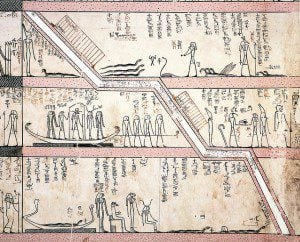There is a tension between the process of reconstruction and the experience of mysticism.
The mystical experience is not one that can easily be written down (though many poets have tried, and some have had more success than others). In a religious context dominated by the stricter reconstructionist methodologies, that stuff that isn’t written down, most preferably in a book released by a reputable academic press, tends to be viewed with some suspicion. Subjective experiences are potentially treacherous; the question “How do you know they’re not making it up?” seems to float under the subtext of a great number of rejections of the mystical experience in others.
Some reconstructionist groups go so far as to reject work with mysteries entirely, dealing only in those things that can be found in the archaeological and textual records. Because private and esoteric practices left little decipherable material behind, those processes cannot be reconstructed exactly as they were; some have argued that it is inappropriate to even consider this kind of religious practice. (I have even seen it argued that since human neglect led to the disappearance of the gods-granted knowledge of holy mysteries, the mysteries are things that we don’t get to have anymore, as if they were toys to be taken away from unruly children.)
It is a simple fact, though, that the odds are that we’re not going to get, say, the Eleusinian Mysteries back. (I gave a talk on mysteries and reconstruction at this past year’s Paganicon, and part of that was a ramble about all the stuff we know about the Eleusinian Mysteries, which are extremely well-documented in some ways. In the end, nobody seemed to have much confidence they could pull that off.) Even if someone does manage to hit on the right ritual procedures to reproduce the effects of some of those known, named, and now-lost mysteries, we’ll never know if they got it right. It’ll be such-and-so coven’s Kore-and-Demeter torchlight ritual play and none of the rest of us will ever know.
This doesn’t mean that pursuing mystery work is a waste of time for reconstructionists; it does require a different process from attempting to decipher what procedures the (usually formal and/or upper-class, since those were more likely to be recorded) ancient practitioners of religions used to honor gods, spirits, ancestors, and whoever else, and then doing likewise. Instead of building a procedure to ancient blueprints, we are left with building a container, discovering what experiences can be held in that space, and elaborating, refining, and rearranging that container until the desired experiences arise naturally and reliably from the format.
(The actual lynchpin of my conversion to Egyptian reconstructionist practice actually went a bit like this. I decided to try a particular group’s suggested basic ritual, and came out of it saying, “Wow. That was the best damn ground and center I’ve ever encountered.” And since I had a history of, at best, feeling like a fool when doing rituals, having a completely positive reaction to a small ritual was a pretty amazing experience all by itself.)
The mysteries we discover with this kind of process will not be the same as ancient ones. However, they will be accessible to people of the time and place where they are found, they will be relevant to our modern practices, and they will be teachable within our lines of study. I do think that this can only reach its pinnacle of health within a context of a vibrant and consistent mainstream pagan culture of relevant, related practices, so that people can become familiar with the containers into which ecstatic experience can be poured.
A meaningful pursuit of reconstructionist-oriented religion will return to the source texts and information that has been used to build the public rituals and assemble the festival calendars, and will then try to find ways which these can be iterated into deeper understandings: for example, not just tracing the progression of the sunboat through the twelve hours of the night as a sacred story, but exploring that passage as a mystical journey, and finding ways to construct cycles of practice that enable developing deeper personal understandings of that journey when repeated over time.
Hills of the Horizon is an occasional column by Egyptian reconstructionist pagan Kiya Nicoll. Subscribe via RSS or e-mail!














